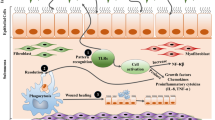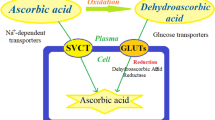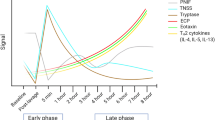Abstract
Diosmetin is a flavonoid compound with various pharmacological activities, which plays a vital role in alleviating the development of asthma and atopic dermatitis. However, the role of diosmetin in allergic rhinitis is unclear. Our study aimed to investigate the effects of diosmetin on AR progression and the underlying molecular mechanisms. The allergic rhinitis murine model was established via ovalbumin challenge, followed by administration with diosmetin or dexamethasone. Before mice were sacrificed, nasal symptoms were evaluated. The histopathological examination of nasal mucosa was performed through hematoxylin–eosin and toluidine blue staining. The levels of histamine, ovalbumin-specific IgE, and ovalbumin-specific IgG1 in serum of mice and the levels of Th1/Th2-related cytokines and pro-inflammatory cytokines in nasal lavage fluid of mice were determined by enzyme-linked immunosorbent assay. The protein levels of silent information regulator 1 (SIRT1) and nuclear factor kappa B (NF-κB) pathway-related molecules were detected by western blotting. Diosmetin improved nasal symptoms, and downregulated the serum levels of histamine, IgE, and IgG1 in allergic rhinitis mice. Diosmetin attenuated eosinophil and mast cell infiltration in nasal mucosa tissues, decreased the migration of inflammatory cells into the nasal lavage fluid, and improved the Th1/Th2 cytokine imbalance in nasal lavage fluid. Diosmetin upregulated SIRT1 and inactivated the NF-κB pathway in allergic rhinitis mice. Furthermore, treatment with an SIRT1 inhibitor (EX-527) overturned the effects of diosmetin on the SIRT1/NF-κB signaling, Th1/Th2 cytokine imbalance, and nasal inflammation in allergic rhinitis mice. Diosmetin ameliorates nasal inflammation and Th1/Th2 imbalance by regulating the SIRT1/NF-κB signaling in allergic rhinitis mice.
Graphical Abstract









Similar content being viewed by others
Data Availability
The datasets used or analyzed during the current study are available from the corresponding author on reasonable request.
References
Abelson M, Shetty S, Korchak M, Butrus S, Smith L (2015) Advances in pharmacotherapy for allergic conjunctivitis. Expert Opin Pharmacother 16:1219–1231. https://doi.org/10.1517/14656566.2015.1040760
Asayama K, Kobayashi T, D’Alessandro-Gabazza C, Toda M, Yasuma T, Fujimoto H, Okano T, Saiki H, Takeshita A, Fujiwara K, Fridman D’Alessandro V, Nishihama K, Totoki T, Inoue R, Takei Y, Gabazza E (2020) Protein S protects against allergic bronchial asthma by modulating Th1/Th2 balance. Allergy 75:2267–2278. https://doi.org/10.1111/all.14261
Chen M, Chen Z, Huang D, Sun C, **e J, Chen T, Zhao X, Huang Y, Li D, Wu B, Wu D (2020a) Myricetin inhibits TNF-α-induced inflammation in A549 cells via the SIRT1/NF-κB pathway. Pulm Pharmacol Ther 65:102000. https://doi.org/10.1016/j.pupt.2021.102000
Chen Y, Wang Y, Liu M, Zhou B, Yang G (2020b) Diosmetin exhibits anti-proliferative and anti-inflammatory effects on TNF-α-stimulated human rheumatoid arthritis fibroblast-like synoviocytes through regulating the Akt and NF-κB signaling pathways. Phytother Res 34:1310–1319. https://doi.org/10.1002/ptr.6596
Diamant Z, Boot J, Mantzouranis E, Flohr R, Sterk P, Gerth van Wijk R (2010) Biomarkers in asthma and allergic rhinitis. Pulm Pharmacol Ther 23:468–481. https://doi.org/10.1016/j.pupt.2010.06.006
Dong J, Xu O, Wang J, Shan C, Ren X (2021) Luteolin ameliorates inflammation and Th1/Th2 imbalance via regulating the TLR4/NF-κB pathway in allergic rhinitis rats. Immunopharmacol Immunotoxicol 43:319–327. https://doi.org/10.1080/08923973.2021.1905659
Fang Y, Nicholl MB (2014) A dual role for sirtuin 1 in tumorigenesis. Curr Pharm Des 20:2634–2636. https://doi.org/10.2174/13816128113199990488
Ge A, Liu Y, Zeng X, Kong H, Ma Y, Zhang J, Bai F, Huang M (2015) Effect of diosmetin on airway remodeling in a murine model of chronic asthma. Acta Biochim Biophys Sin 47:604–611. https://doi.org/10.1093/abbs/gmv052
Guo-Zhu H, **-Ling Z, Zhu W, Li-Hua W, Dan H, **ao-Mu W, Wen-Yun Z, Wei-Xu H (2015) Therapeutic potential of combined anti-IL-1β IgY and anti-TNF-α IgY in guinea pigs with allergic rhinitis induced by ovalbumin. Int Immunopharmacol 25:155–161. https://doi.org/10.1016/j.intimp.2014.12.002
Hemmati S, Rahimi N, Dabiri S, Alaeddini M, Etemad-Moghadam S, Dehpour A (2019) Inhibition of ovalbumin-induced allergic rhinitis by sumatriptan through the nitric oxide pathway in mice. Life Sci 236:116901. https://doi.org/10.1016/j.lfs.2019.116901
Hoyte F, Nelson H (2018) Recent advances in allergic rhinitis. F1000Res 7:1333. https://doi.org/10.12688/f1000research.15367.1
Huang D, Sun C, Chen M, Bai S, Zhao X, Wang W, Geng K, Huang W, Zhao T, Wu B, Zhang G, Wu D, Xu Y (2022) Bergenin ameliorates airway inflammation and remodeling in asthma by activating SIRT1 in macrophages to regulate the NF-κB pathway. Front Pharmacol 13:994878. https://doi.org/10.3389/fphar.2022.994878
Hyun J, Woo Y, Hwang DS, Jo G, Eom S, Lee Y, Park JC, Lim Y (2010) Relationships between structures of hydroxyflavones and their antioxidative effects. Bioorg Med Chem Lett 20:5510–5513. https://doi.org/10.1016/j.bmcl.2010.07.068
Lee D, Park J, Choi J, Jang H, Seol J (2020) Anti-inflammatory effects of natural flavonoid diosmetin in IL-4 and LPS-induced macrophage activation and atopic dermatitis model. Int Immunopharmacol 89:107046. https://doi.org/10.1016/j.intimp.2020.107046
Li H, Wei Y, Li X, Zhang S, Zhang R, Li J, Ma B, Shao S, Lv Z, Ruan H, Zhou H, Yang C (2022) Diosmetin has therapeutic efficacy in colitis regulating gut microbiota, inflammation, and oxidative stress via the circ-Sirt1/Sirt1 axis. Acta Pharmacol Sin 43:919–932. https://doi.org/10.1038/s41401-021-00726-0
Lin Y, Chen S, Wang J (2016) Critical role of IL-6 in dendritic cell-induced allergic inflammation of asthma. J Mol Med 94:51–59. https://doi.org/10.1007/s00109-015-1325-8
Liu S, Shen H, Li J, Gong Y, Bao H, Zhang J, Hu L, Wang Z, Gong J (2020) Loganin inhibits macrophage M1 polarization and modulates sirt1/NF-κB signaling pathway to attenuate ulcerative colitis. Bioengineered 11:628–639. https://doi.org/10.1080/21655979.2020.1774992
Meltzer E, Bukstein D (2011) The economic impact of allergic rhinitis and current guidelines for treatment. Ann Allerg Asthma Im 106:S12–S16. https://doi.org/10.1016/j.anai.2010.10.014
Piao CH, Fan YJ, Nguyen TV, Song CH, Chai OH (2020a) Mangiferin alleviates ovalbumin-induced allergic rhinitis via Nrf2/HO-1/NF-κB signaling pathways. Int J Mol Sci 21:3415. https://doi.org/10.3390/ijms21103415
Piao CH, Song CH, Lee EJ, Chai OH (2020b) Saikosaponin A ameliorates nasal inflammation by suppressing IL-6/ROR-γt/STAT3/IL-17/NF-κB pathway in OVA-induced allergic rhinitis. Chem Biol Interact 315:108874. https://doi.org/10.1016/j.cbi.2019.108874
Sordon S, Popłoński J, Milczarek M, Stachowicz M, Tronina T, Kucharska AZ, Wietrzyk J, Huszcza E (2019) Structure-antioxidant-antiproliferative activity relationships of natural C7 and C7–C8 hydroxylated flavones and flavanones. Antioxidants 8:210. https://doi.org/10.3390/antiox8070210
Wei-Xu H, Qin X, Zhu W, Yuan-Yi C, Li-Feng Z, Zhi-Yong L, Dan H, **ao-Mu W, Guo-Zhu H (2014) Therapeutic potential of anti-IL-1β IgY in guinea pigs with allergic asthma induced by ovalbumin. Mol Immunol 58:139–149. https://doi.org/10.1016/j.molimm.2013.11.006
Xu H, Wang L, Chen H, Cai H (2022) HDAC4 depletion ameliorates IL-13-triggered inflammatory response and mucus production in nasal epithelial cells via activation of SIRT1/NF-κB signaling. Immun Inflamm Dis 10:e692. https://doi.org/10.1002/iid3.692
Xu S, Kong Y, Jiao W, Yang R, Qiao Y, Xu Y, Tao Z, Chen S (2019) Tangeretin promotes regulatory T cell differentiation by inhibiting Notch1/Jagged1 signaling in allergic rhinitis. Int Immunopharmacol 72:402–412. https://doi.org/10.1016/j.intimp.2019.04.039
Zhang Y, Jiang Y, Lu D (2019) Diosmetin suppresses neuronal apoptosis and inflammation by modulating the phosphoinositide 3-kinase (PI3K)/AKT/nuclear Factor-κB (NF-κB) signaling pathway in a rat model of pneumococcal meningitis. Med Sci Monit 25:2238–2245
Zhang Y, Lan F, Zhang L (2021) Advances and highlights in allergic rhinitis. Allergy 76:3383–3389. https://doi.org/10.1111/all.15044
Zhou Y, Wang H, Sui H, Li L, Zhou C, Huang J (2016) Inhibitory effect of baicalin on allergic response in ovalbumin-induced allergic rhinitis guinea pigs and lipopolysaccharide-stimulated human mast cells. Inflam Res 65:603–612. https://doi.org/10.1007/s00011-016-0943-0
Zou B, Fu Y, Cao C, Pan D, Wang W, Kong L (2021) Gentiopicroside ameliorates ovalbumin-induced airway inflammation in a mouse model of allergic asthma via regulating SIRT1/NF-κB signaling pathway. Pulm Pharmacol Ther 68:102034. https://doi.org/10.1016/j.pupt.2021.102034
Acknowledgements
The authors appreciate all the participants providing supports for this study.
Author information
Authors and Affiliations
Contributions
QH conceived and designed the experiments. QH and LP carried out the experiments, analyzed the data, and drafted the manuscript. All authors agreed to be accountable for all aspects of the work. All authors have read and approved the final manuscript.
Corresponding author
Ethics declarations
Ethics Approval and Consent to Participate
The Institutional Animal Care and Use Committee of Hubei Provincial Hospital of TCM (Wuhan, China) approved all experimental protocols.
Rights and permissions
Springer Nature or its licensor (e.g. a society or other partner) holds exclusive rights to this article under a publishing agreement with the author(s) or other rightsholder(s); author self-archiving of the accepted manuscript version of this article is solely governed by the terms of such publishing agreement and applicable law.
About this article
Cite this article
Hu, Q., Peng, L. Diosmetin Alleviates Ovalbumin-Induced Nasal Inflammation by Regulating the SIRT1/NF-κB Signaling in Mouse Models of Allergic Rhinitis. Rev. Bras. Farmacogn. 33, 1232–1242 (2023). https://doi.org/10.1007/s43450-023-00448-w
Received:
Accepted:
Published:
Issue Date:
DOI: https://doi.org/10.1007/s43450-023-00448-w




